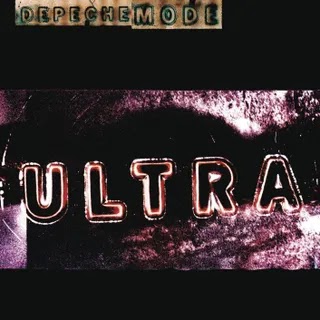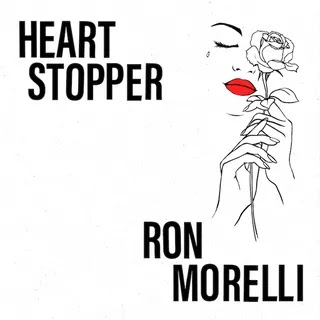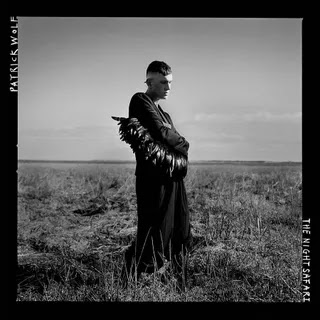Each Sunday, Pitchfork takes an in-depth look at a significant album from the past, and any record not in our archives is eligible. Today, we revisit Depeche Mode’s lush and electronic 1997 album, a bridge between the increasing ambition of their early years and the easy confidence of their later ones.
With a nearly all-synth approach that balanced technological exploration and pop hooks, Depeche Mode built a canon and a fanbase across the world in the 1980s. In their music, personal, political, and emotional angst could sound both catchy and danceable. Even when regularly dealing with assumptions they somehow weren’t making “real” music, they broke through in a big way—and then it all went to hell.
Soon after the massive triumph of their 1990 opus Violator and the epochal hits “Personal Jesus” and “Enjoy the Silence,” lead singer Dave Gahan moved from the UK to Los Angeles and became a louche rock star, or a visually coded version of one—long hair, beard, tattoos. It was in marked contrast to his clean-cut appearance until that point, and it became the visual signal of deeper troubles. During the recording of 1993’s Songs of Faith and Devotion and its subsequent tours, he plunged into a brutal heroin addiction, while guitarist and songwriter Martin Gore wrestled with alcoholism, all of which factored into the worsening depression and eventual nervous breakdown of keyboardist Andrew Fletcher.
In D. A. Pennebaker’s 1989 Depeche concert film 101, Fletcher memorably and self-deprecatingly called himself the member who just “bum[med] around,” but in truth he had become Depeche’s in-house manager, now trying desperately to hold everything together. The overlay of increasing internal dysfunction led Alan Wilder, the group’s key musical experimenter and arranger, to finally leave the band in 1995. Gahan first attempted suicide that same year and almost fatally overdosed in 1996 during a break in the recording sessions. The band’s dysfunction seemed worse than ever.
In this light, Ultra shouldn’t have existed. An official album documentary released as part of the group’s late 2000s reissue series details the impact of Wilder’s departure and Gahan’s crises in particular, and how what typically might have been a three-month effort took close to a year’s worth of on-and-off work. Yet in the end, the trio of Gahan, Gore, and Fletcher put their name to one of Depeche Mode’s best albums, an all-in all-great listen that would be the obvious peak of a lesser band’s catalog. It formed a crucial bridge between the increasing ambition of their early years and the easy confidence of their later ones. If a sick sense of humor was at work, talk about a last laugh.
Two things were key. First, Tim Simenon, who had made waves as dance act Bomb the Bass with “Beat Dis” alongside numerous production and remix jobs including Neneh Cherry’s “Buffalo Stance” and Björk’s “Play Dead,” came on board. Gore and Gahan were fans of an album he worked on, the intriguing 1995 release Shag Tobacco, by ex-Virgin Prunes singer Gavin Friday, which touched on dance and hip-hop as much as it did late-night jazz or mood music. So Simenon, assisted by regular engineer Q Engstrom, or simply Q, handled the production while keyboardist Dave Clayton and programmer Kerry Hopwood were added as key additional studio musicians. A little further advice from Mute founder and eternal band confidant Daniel Miller didn’t hurt, according to Hopwood: “Daniel gave us a great quote at the beginning: ‘Lads, put everything through a valve.’” Miller was referring to the kind of valve-based tape recorders the Beatles had used through most of their career at EMI Studios; Ultra’s resulting sound was enveloping, almost tactile.
Equally importantly and as part of his recovery, Gahan worked seriously on something key: voice lessons. He’d long since built up his powers of projection: The sweetly peppy vocalist of “Just Can’t Get Enough” turned into a force able to fill the space of the arenas the band was now inhabiting. But by learning how to control, relax, and preserve his instrument, he was able to expand his range and deliver performances that once seemed out of reach. Gore continued to write strong songs throughout this process. His knack for intriguing, catchy melodies matched his portrayals of melodramatic emotional states, and provided the bedrock for Ultra’s development.
“Barrel of a Gun,” both the album opener and lead single, had a lot riding on it, and it turned out to be the searing mirror image of Songs of Faith and Devotion’s own double-duty effort, “I Feel You.” That song was all feedback-laden priapic raunch; in contrast, “Barrel” is a slow grinding descent. Gahan sounds defiant but still wounded, at points ragged. Gore’s tightly wound guitar part is accentuated by massive beats that could suddenly turn even bigger. It feels like the closest that Gore ever got to writing about Gahan’s depths of despair; given how harrowing the experience had been for the band, you could easily imagine a full album exploring that extreme.
But the next track, “The Love Thieves,” is a near 180-degree turn—gentle, tender, and close, like you’ve stumbled across a small combo in a mythical late-night bar, setting an atmosphere. The real shock, though, is Gahan’s voice—his new training is evident from the first syllables, hitting higher notes, sounding smoother without being overly polished. You can almost hear his pleasure, which carries through the album; he experiments just so, his more commanding moments now less glowering, his quieter moments more inviting. Depeche had consistently created music that oozed lust one way or another—Gahan had now become a relaxed loverman.
The whole collective approach had a standout moment with “It’s No Good,” Ultra’s biggest relative hit in America (in Europe, as with “Barrel of a Gun” and the album itself, it scored far higher, reaching No. 1 in numerous countries). Simenon and company created a great arrangement, starting with a pulsing chug, suddenly hitting an explosive, slow bounce, with shuddering sounds as the undercarriage and a huge, focused, and ominous hook. Call it their own collective riff on G-funk that all leads into Gahan delivering a suave-as-hell lead vocal. Gore’s lyric is almost a raunchy riff on Christopher Marlowe’s “The Passionate Shepherd to His Love,” but it’s Gahan’s confident delivery that turns it into a confession of barely suppressed mutual interest—in love, sex, or some combination thereof.
Throughout Ultra, the core sense of what Depeche was meant to be in this new phase gets tested and subtly reinvented or reframed. They’re still an electronic group at base, part of a musical universe increasingly receptive to that idea, but they didn’t want to be limited by that description either. Part of that variety lies in the use of outside musicians beyond Clayton and Hopwood; while there had been a couple of extra performers and singers on Songs of Faith and Devotion, the numerous instrumentalists here take a bow, most often in the rhythm section, creating bespoke parts that were then looped into the final results.
Drumming pro Victor Indrizzo provided the beats for “Barrel of a Gun” and “It’s No Good,” while the crack Sugar Hill/Tackhead rhythm section of Doug Wimbish and Keith LeBlanc delivered a sharp, roiling groove for another standout single, the emotional confrontation of “Useless,” further helped by Simply Red drummer Gota Yashiki. Meantime, one of two Gore lead vocals on the album, “The Bottom Line,” featured an unexpected but thoroughly striking pairing of UK steel guitar legend B.J. Cole and Can’s brilliant Jaki Liebezeit, on a performance that Gore assayed with reflective but compelling calm.
Gore’s other lead vocal, “Home,” is a passionate, string-swept declaration of love that seems rooted in his then-recent marriage. Gore’s striking performances of the song, done in combination with backing singers, was a highlight of the comeback tour that eventually followed, although it wasn’t a tour for Ultra. While a slightly ad hoc version of the band performed a couple small promotional shows and TV appearances upon the album’s release, the group only returned for a world tour after Gahan was much more settled and healthy, in support of their second singles compilations, released in late 1998.
That tour answered the last remaining question as to whether Depeche would be fully back, with two new musicians, keyboardist Peter Gordeno and drummer Christian Eigner, anchoring the live lineup from that point forward. Given its by-default retrospective nature solely focusing on the newly collected singles, the tour was also the unspoken transition—one that a full Ultra tour would likely have just as immediately shown—from a fully in-the-moment act to one of comfortable veterans.
It wasn’t quite that Depeche had nothing left to prove, but at almost two decades in, Gahan’s recovery and vocal transformation—and the revamped touring lineup—built on Ultra’s mood to let them steer a new, less generally chaotic way forward. Their core fanbase never left them as they settled into new albums and tours every few years, while they had already inspired any number of younger musicians in turn—to name just two examples, a song like Nine Inch Nails’ “Closer” made Depeche’s emotional and musical tension more explicit, while Shakira later described first hearing “Enjoy the Silence” in 1990 as fully sparking her interest in music—with many more to come.
The 1998 tour featured Ultra’s singles but left out everything else, including its final song, the intense grace of “Insight.” The album’s sequencing is remarkable and only “Insight” could have ended it. After starting with one of the album’s trademark arrangements—warm, though murky and slightly melancholy—Gahan’s entrancing voice delivers Gore’s sentiments of renewal: “This is the first chance/To put things right/Moving on guided by the light.” Gore’s harmonies, always one of the band’s secret weapons, intensify the mood, and his soft, repeated delivery of “Give love/You’ve got to give love” provides an elegant conclusion. But the most dramatic part is when Gahan sings “The fire still burns” as Gore matches him and stretches out “burns” as it melts into a rich descending orchestration, which he then adds further wordless harmonies to. It’s breathtaking, still.
Strictly speaking, Ultra doesn’t end there—in a very 1990s moment, there’s a brief hidden instrumental, “Junior Painkiller,” that follows after a short gap—but “Insight” is the ultimate counterbalance to “Barrel of a Gun,” an exchange of fraught desperation and on the brink feelings delivered at high volume for maximum impact, for something else entirely. It is reductive to say that it and Ultra as a whole was Depeche all grown up, but there is a feeling of hard-earned experience, of moving beyond younger behavior that courted disaster. Ultra is an album for reflective nights remembering past selves, a beautifully synthesized combination of talents making music that reflects experience without being trapped by it.



%20Music%20Album%20Reviews.webp)












0 comments:
Post a Comment